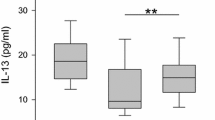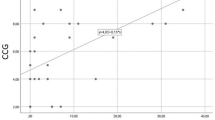Abstract
Allergic rhinitis (AR), nasal polyps (NP) as well as chronic rhinosinusitis (CRS) are all known to be associated with eosinophilic infiltration and elevated numbers of mast cells (MC) within the mucosa. Both cell types and their markers eosinophilic cationic protein (ECP) and tryptase are utilized in the diagnosis and management of chronic sino-nasal diseases. Mucosal cytology samples were gathered by cytobrush, histological samples were obtained from the inferior turbinate. In both sample sets, the number of eosinophils and MC was determined. Their corresponding markers ECP and tryptase were quantified from nasal discharge. Patients were grouped with reference to their main diagnosis: AR (n = 34), NP (n = 25), CRS (n = 27) and controls (n = 34). Eosinophil counts from cytobrush and ECP levels were significantly elevated in NP compared to all other groups—31- and 13-fold over control, respectively. However, histologic review did not reveal any difference in eosinophil count among groups. Tryptase was significantly elevated threefold in AR versus CRS and controls. No correlation to cytological and histological MC counts could be found. ECP levels in nasal discharge as well as eosinophil counts can provide useful information with regard to the diagnosis. Likewise, tryptase concentrations can do. The presented data show that the measurement of markers in nasal discharge is superior in differentiating among diagnosis groups. Given that the collection of nasal secretions is more comfortable for patients than the more invasive techniques, we recommend first line ECP and tryptase testing performed on nasal secretions.




Similar content being viewed by others
References
Braun H, Stammberger H, Buzina W, Freudenschuss K, Lackner A, Beham A (2003) Incidence and detection of fungi and eosinophilic granulocytes in chronic rhinosinusitis. Laryngorhinootologie 82:330–340
Hedman J, Kaprio J, Poussa T, Nieminen MM (1999) Prevalence of asthma, aspirin intolerance, nasal polyposis and chronic obstructive pulmonary disease in a population-based study. Int J Epidemiol 28:717–722
Settipane GA, Chafee FH (1977) Nasal polyps in asthma and rhinitis. A review of 6,037 patients. J Allergy Clin Immunol 59:17–21
Stoop AE, van der Heijden HA, Biewenga J, van der Baan S (1993) Eosinophils in nasal polyps and nasal mucosa: an immunohistochemical study. J Allergy Clin Immunol 91:616–622
Mygind N (1990) Nasal polyposis. J Allergy Clin Immunol 86:827–829
Drake-Lee AB, Barker TH, Thurley KW (1984) Nasal polyps. Scanning electron microscopy and artifact. J Laryngol Otol 98:285–292
Borish L (2003) Allergic rhinitis: systemic inflammation and implications for management. J Allergy Clin Immunol 112:1021–1031
Bentley AM, Jacobson MR, Cumberworth V, Barkans JR, Moqbel R, Schwartz LB, Irani AM, Kay AB, Durham SR (1992) Immunohistology of the nasal mucosa in seasonal allergic rhinitis: increases in activated eosinophils and epithelial mast cells. J Allergy Clin Immunol 89:877–883
Gaga M, Lambrou P, Papageorgiou N, Koulouris NG, Kosmas E, Fragakis S, Sofios C, Rasidakis A, Jordanoglou J (2000) Eosinophils are a feature of upper and lower airway pathology in non-atopic asthma, irrespective of the presence of rhinitis. Clin Exp Allergy 30:663–669
Kampe M, Stolt I, Lampinen M, Janson C, Stalenheim G, Carlson M (2011) Patients with allergic rhinitis and allergic asthma share the same pattern of eosinophil and neutrophil degranulation after allergen challenge. Clin Mol Allergy 9:3
Kaliner M (1998) Medical management of sinusitis. Am J Med Sci 316:21–28
Fokkens W, Lund V, Mullol J (2007) European position paper on rhinosinusitis and nasal polyps 2007. Rhinol Suppl 20:1–136
Bachert C, Hormann K, Mosges R, Rasp G, Riechelmann H, Muller R, Luckhaupt H, Stuck BA, Rudack C (2003) An update on the diagnosis and treatment of sinusitis and nasal polyposis. Allergy 58:176–191
Behnecke A, Mayr S, Schick B, Iro H, Raithel M (2008) Evaluation of ECP release from intact tissue biopsies from patients with nasal polyps. Inflamm Res 57(Suppl 1):S65–S66
Beppu T, Ohta N, Gon S, Sakata K, Inamura K, Fukase S, Kimura Y, Koike Y (1994) Eosinophil and eosinophil cationic protein in allergic rhinitis. Acta Otolaryngol Suppl 511:221–223
Church MK, Levi-Schaffer F (1997) The human mast cell. J Allergy Clin Immunol 99:155–160
Stone KD, Prussin C, Metcalfe DD (2010) IgE, mast cells, basophils, and eosinophils. J Allergy Clin Immunol 125:S73–S80
Rasp G, Hochstrasser K (1993) Tryptase in nasal fluid is a useful marker of allergic rhinitis. Allergy 48:72–74
Canakcioglu S, Tahamiler R, Saritzali G, Alimoglu Y, Isildak H, Guvenc MG, Acar GO, Inci E (2009) Evaluation of nasal cytology in subjects with chronic rhinitis: a 7-year study. Am J Otolaryngol 30:312–317
Bousquet J, Khaltaev N, Cruz AA et al (2008) Allergic rhinitis and its impact on asthma (ARIA) 2008 update (in collaboration with the World Health Organization, GA(2)LEN and AllerGen). Allergy 63(Suppl 86):8–160
Rasp G (1992) Allergic rhinopathy: magic lite SQ allergy screen inhalant and CAP-FEIA SX1–comparison of two allergen-specific screening tests in serum. Laryngorhinootologie 71:298–301
Kramer MF, Burow G, Pfrogner E, Rasp G (2004) In vitro diagnosis of chronic nasal inflammation. Clin Exp Allergy 34:1086–1092
Pipkorn U, Karlsson G, Enerback L (1988) A brush method to harvest cells from the nasal mucosa for microscopic and biochemical analysis. J Immunol Methods 112:37–42
Abu-Ghazaleh RI, Dunnette SL, Loegering DA, Checkel JL, Kita H, Thomas LL, Gleich GJ (1992) Eosinophil granule proteins in peripheral blood granulocytes. J Leukoc Biol 52:611–618
Bystrom J, Garcia RC, Hakansson L, Karawajczyk M, Moberg L, Soukka J, Venge P (2002) Eosinophil cationic protein is stored in, but not produced by, peripheral blood neutrophils. Clin Exp Allergy 32:1082–1091
Sur S, Glitz DG, Kita H, Kujawa SM, Peterson EA, Weiler DA, Kephart GM, Wagner JM, George TJ, Gleich GJ, Leiferman KM (1998) Localization of eosinophil-derived neurotoxin and eosinophil cationic protein in neutrophilic leukocytes. J Leukoc Biol 63:715–722
Bhattacharyya N (2005) Symptom and disease severity differences between nasal septal deviation and chronic rhinosinusitis. Otolaryngol Head Neck Surg 133:173–177
Bernstein JM, Gorfien J, Noble B, Yankaskas JR (1997) Nasal polyposis: immunohistochemistry and bioelectrical findings (a hypothesis for the development of nasal polyps). J Allergy Clin Immunol 99:165–175
Jahnsen FL, Haraldsen G, Aanesen JP, Haye R, Brandtzaeg P (1995) Eosinophil infiltration is related to increased expression of vascular cell adhesion molecule-1 in nasal polyps. Am J Respir Cell Mol Biol 12:624–632
Monteseirin J, Vega A (2008) Eosinophil cationic protein is not only a distinctive eosinophil protein. Thorax 63:185
Monteseirin J, Vega A, Chacon P, Camacho MJ, El Bekay R, Asturias JA, Martinez A, Guardia P, Perez-Cano R, Conde J (2007) Neutrophils as a novel source of eosinophil cationic protein in IgE-mediated processes. J Immunol 179:2634–2641
Bryson JM, Tasca RA, Rowe-Jones JM (2003) Local and systemic eosinophilia in patients undergoing endoscopic sinus surgery for chronic rhinosinusitis with and without polyposis. Clin Otolaryngol Allied Sci 28:55–58
Chen ST, Sun HL, Lu KH, Lue KH, Chou MC (2006) Correlation of immunoglobulin E, eosinophil cationic protein, and eosinophil count with the severity of childhood perennial allergic rhinitis. J Microbiol Immunol Infect 39:212–218
Di Lorenzo G, Mansueto P, Melluso M, Candore G, Colombo A, Pellitteri ME, Drago A, Potestio M, Caruso C (1997) Allergic rhinitis to grass pollen: measurement of inflammatory mediators of mast cell and eosinophils in native nasal fluid lavage and in serum out of and during pollen season. J Allergy Clin Immunol 100:832–837
Varney VA, Jacobson MR, Sudderick RM, Robinson DS, Irani AM, Schwartz LB, Mackay IS, Kay AB, Durham SR (1992) Immunohistology of the nasal mucosa following allergen-induced rhinitis. Identification of activated T lymphocytes, eosinophils, and neutrophils. Am Rev Respir Dis 146:170–176
Kaliner MA, Osguthorpe JD, Fireman P, Anon J, Georgitis J, Davis ML, Naclerio R, Kennedy D (1997) Sinusitis: bench to bedside. Current findings, future directions. J Allergy Clin Immunol 99:S829–S848
Mygind N (1999) Advances in the medical treatment of nasal polyps. Allergy 54(Suppl 53):12–16
Omenaas E, Bakke P, Elsayed S, Hanoa R, Gulsvik A (1994) Total and specific serum IgE levels in adults: relationship to sex, age and environmental factors. Clin Exp Allergy 24:530–539
Zhang Y, Liu C, Han D, Zhang L (2011) Correlation of routine examinations for the diagnosis of house dust mite allergic rhinitis. ORL J Otorhinolaryngol Relat Spec 73:182–188
Gevaert P, Holtappels G, Johansson SG, Cuvelier C, Cauwenberge P, Bachert C (2005) Organization of secondary lymphoid tissue and local IgE formation to Staphylococcus aureus enterotoxins in nasal polyp tissue. Allergy 60:71–79
Conflict of interest
The authors declare that they have no conflict of interests.
Author information
Authors and Affiliations
Corresponding author
Additional information
M. Gröger and A. Bernt contributed equally to the study.
Rights and permissions
About this article
Cite this article
Gröger, M., Bernt, A., Wolf, M. et al. Eosinophils and mast cells: a comparison of nasal mucosa histology and cytology to markers in nasal discharge in patients with chronic sino-nasal diseases. Eur Arch Otorhinolaryngol 270, 2667–2676 (2013). https://doi.org/10.1007/s00405-013-2395-2
Received:
Accepted:
Published:
Issue Date:
DOI: https://doi.org/10.1007/s00405-013-2395-2




